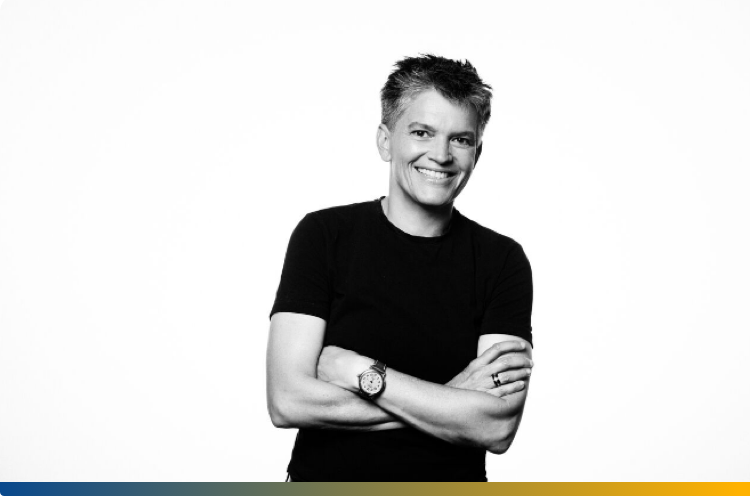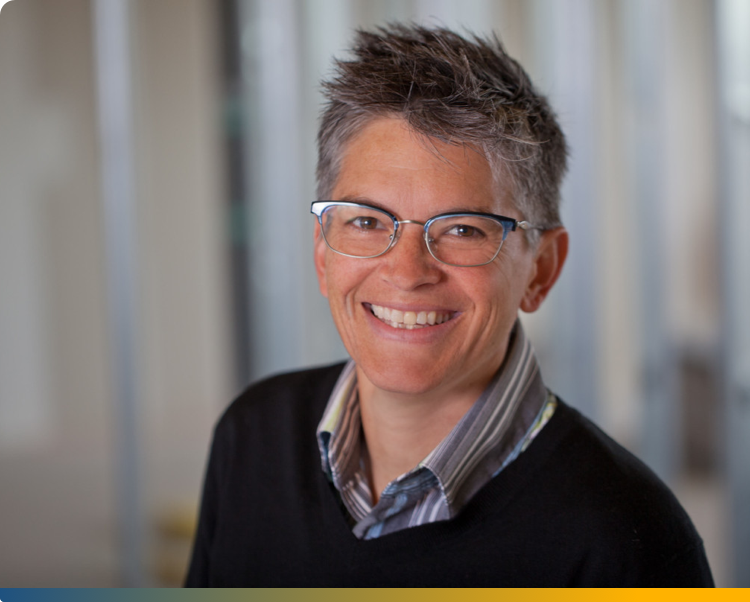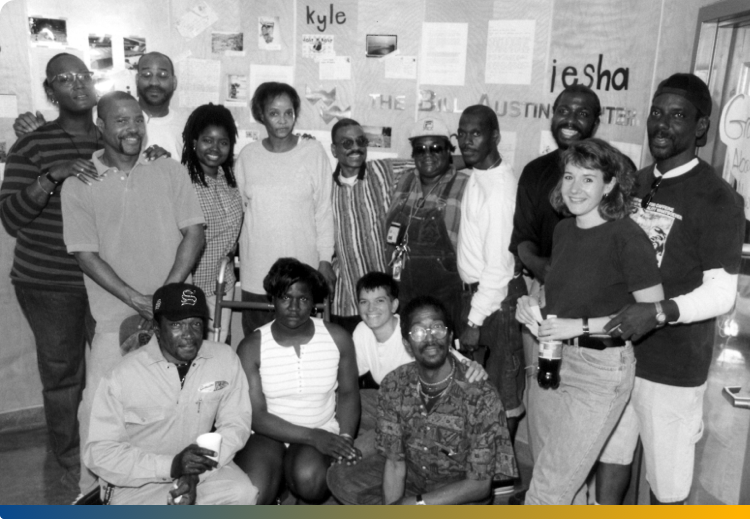As part of Whitman-Walker’s 40th anniversary, officially January 13, 2018, we’re sharing 40 stories to help tell the narrative of Whitman-Walker in community. Please meet Joanne Sincero, a veteran employee of the Whitman-Walker family. Joanne began working with people experiencing homelessness in DC at N Street Village in the late 1980s. Her innate empathy and dedication to serving others led her to work at Whitman-Walker’s Bill Austin Center Day Treatment program in 1994. Now the Wellness Coordinator at Whitman-Walker, Joanne shares her personal and professional journey.
Click the orange play button below to hear Joanne’s November 13, 2017 oral history – a recorded interview with an individual having personal knowledge of past events. Thank you to the DC Oral History Collaborative for supporting the collection of this oral history.
Five Quotes from Joanne’s Oral History
On the Importance of Empathy in Her Work:
“In my life, I feel like there’s this sort of overarching kind of sense of I think I always felt a little bit other than that, an outside, and be able to see outsider and maybe because of that really giving a sense of empathy for people who were struggling for whatever reason. Probably that’s the HIV piece, too. I didn’t mean that I had to necessarily walk exactly in someone’s shoes, but I could get a piece of it enough to understand how that might be for somebody and then just to see how could I help and how could I make a different for some of it.”

A photo of Joanne Sincero from the We See You campaign, photographed by Moshe Zusman.
On Protesting and the Direct Action Group “Oppression Under Target” (OUT) During the AIDS Crisis:
“I remember we did a lot of direct action, and got arrested, and chaining ourselves to the Wilson Building which then was where the city council met. We would go through these whole elaborate timing – like figuring out how you were going to do it. We met across the street in the park that’ still there; not Freedom Plaza, but the other park that’s right next to it. I made sure our watches were all synchronized and at this time because we had one group of people that chained themselves to one end. We chained ourselves with chains through our belts. Then we had a kryptonite bike lock that we chained to the door….Then we did it and we got arrested. At the time the cops would wear gloves on their hands and we had all those chants like, ‘You’ll see it on the news; your gloves don’t match our shoes.’ At that time I remember I had friends who were actively dying, and it was just really sort of hard. I remember laughing while it was happening because it was just this emotion coming out. First of all, you’re doing the things that you’re taught to follow the rules and be good and here you are just right up against that.”
“At that point it was still kind of on the fence about what being gay was. So, being involved in this group was like, “no.” This is important stuff. This is really important. This is for our time. We should be involved in this. So, it really really helped.There was a person who worked in the clinic who was part of this group, called OUT, which was Oppression Under Target, and it was a direct action group that was partly focused on changing, raising awareness on HIV and changing policy, and quickly because there wasn’t a lot of time. Time was being wasted and you were watching people just waste away right before your eyes. For me it kind of happened at the same time as I was coming out. When I got involved with this group I pretty quickly got to know people who were living with AIDS and were really sick.”
On Lesbian Health:
“I think part of it was so much was going towards HIV – necessarily so – but it was kind of easy for lesbian health to just get erased and be kind of invisible. I think that’s kind of an ongoing challenge that’s never really gone away. It was good that there was that and there was some attention to lesbian health. Also, at the time it wasn’t as easy to find providers that we were sure were going to be not only able to understand your needs, but just not be outright hostile, or you would feel that this wasn’t going to be a good situation.”

A staff photo of Joanne Sincero, photographed by Scott Henrichsen.
On Her Start at Whitman-Walker Clinic:
“I started working there not until 1994. I had worked for a number of years in a number of mental health group homes, which I actually kind of liked. I had a different friend who was at the clinic at the time and had known that there was this position in the day treatment program for people living with HIV. To come to Whitman-Walker was like a dream. It was just on so many levels. Just to be in a queer-positive work environment. Now I have to keep reminding myself, ‘Oh yeah, you know,’ because I’ve been there so long it’s kind of like you take it for granted.”
On the Nature of Her Work and the Community of the Bill Austin Center Day Treatment Program:
“First, I was totally overwhelmed and I knew that everything that I need to learn is right here in front of me, from all these people who are here. They’ve been living with HIV. They’ve had to deal with tons of loss. At that point lots of them had dealt with tons of family rejection, societal rejection. Everybody had the story about the paper plates and the plastic spoon and knives where they would be at a family gathering and that’s what kind of plate they would be given. Or, bleach on the toilets and all that kind of stuff.
For a lot of people it was the social support that was so, so important. It was like HIV came in with this big knife and just kind of cut lives up. It was like the before that and the after that. It was kind of about building a whole other life. There wasn’t this sense of “You’re sick; you should stay home.” It was, “You’re sick, but you might as well be sick out in the world.” It wasn’t like you were necessarily going to be sick and then you were going to get better.
I remember one trip we were on, we had gone to a lake and we were swimming. There was a young woman who was a lifeguard. She kept asking us, “What kind of group are you? Where are you from? What kind of group?” Finally one of the clients said, “Well, we’re an adult social club,” which I kind of liked. The reason that she asked and was so persistent was she said, “Oh, we can see how – my uncle is gay.” She was young; she was probably 17. She got this vibe that there were lots of gay folks in the group and she was wanting to talk to somebody about it. So, she ended kind of coming over and having a hot dog, and people talked to her. It was a great little moment. You never know why people are asking things. Sometimes it’s just they need support.”

Joanne is front and center at the Bill Austin Day Treatment Center with clients and Whitman-Walker staff.
On How Whitman-Walker’s History Informs their Approach to Patient Care:
“In terms of patient care, just how important it is for people to feel invested in part of something in that people will do anything if they feel like
they’re a part of the process and that you care about them. I think about people that come to Whitman-Walker today. Even after day treatment closed, and there are still people that stuck with us, it was ’cause they felt like “This is my place, and why am I going to go to some other place? This is my place.” Everybody wants to be treated with dignity and respect, and I think that we really had to learn that in our HIV days, and I think we’ve been able to sort of take it and apply it across the board to everyone.”


